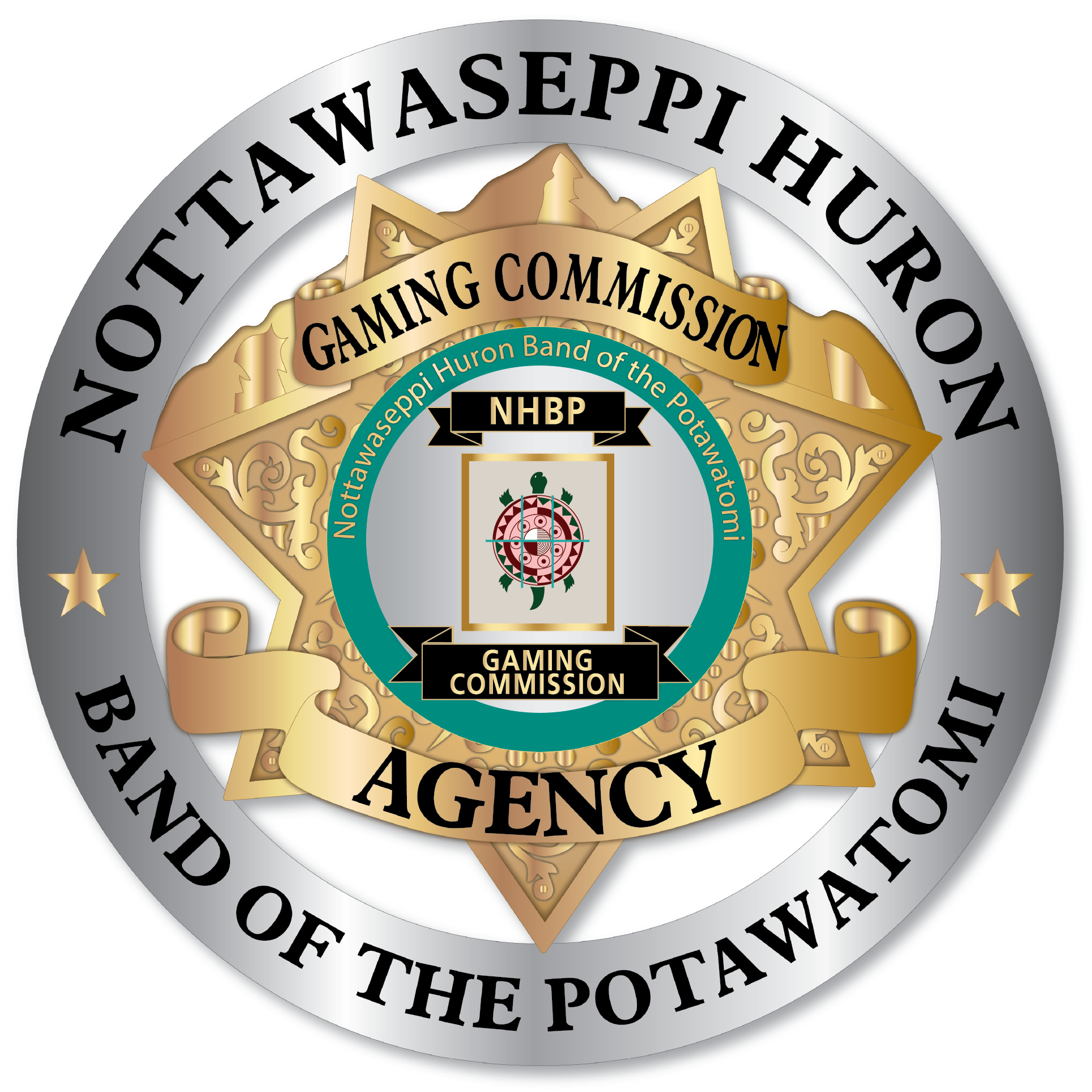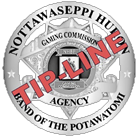Tadiwen Naganjek
Gaming Commission

Purpose of the Gaming Commission
The Gaming Commission’s role is defined by the Nottawaseppi Huron Band of the Potawatomi’s Gaming Regulatory Act of 2010 which made gaming lawful within the Tribe’s jurisdiction and delegated the primary regulatory role to the Commission.
The Commission ensures that all gaming within the Tribe’s jurisdiction is conducted in compliance with Tribal and Federal law and the agreement between the Tribe and the State of Michigan. In exercising its regulatory authority the Commission does not interfere with the managerial discretion of gaming operations.
The Commission’s primary mission is to work within the framework created by the Tribe’s Gaming Regulatory Act of 2010, the Federal Government’s Indian Gaming Regulatory Act (IGRA), and the Compact between the Tribe and the State of Michigan. The confluence of the Tribe’s gaming law, the Federal Government’s gaming law and the Tribe-State compact is to:
- Promote Tribal economic development self-sufficiency and strong Tribal governments
- Maintain the integrity of Indian gaming
- Ensure that the Tribe is the primary beneficiary of its gaming activities
Regulatory Framework
The U.S. Supreme Court ruled in 1987 that states had no authority to prosecute gaming conducted on Indian land (California v. Cabazon). State governments reacted with alarm and Congress began consideration of the Indian Gaming Regulatory Act (IGRA). In 1988, IGRA became law after Tribes and states reached a compromise which gave states unprecedented regulatory participation through the negotiation of Tribal-state gaming compacts.
IGRA recognizes the right of Tribes to conduct gaming on Tribal land in states where similar gaming is permitted outside the Reservation for other purposes. IGRA also emphasizes the dire economic need of Tribes, citing gaming as one of the few revenue-producing opportunities that has generated adequate revenues to sustain Tribal governments.
The Indian Gaming Regulatory Act creates three classes of Tribal gaming: Class I Social games played solely for prizes of minimal value or traditional forms of Indian gaming as part of Tribal ceremonies or celebrations;
Class II Bingo and related games, including pull tabs, lotto, punch boards, tip jars, instant bingo and some card games (excluding house-banked card games), and;
Class III All forms of gaming that are not Class I or Class II, including slot machines and house-banked table games, such as blackjack, roulette and dice games. (Only Class III games require Tribal-state compacts.)
NHBP Independent Gaming Regulatory Framework
Tribal Government gaming on the Potawatomi Reservation is governed in accordance with federal laws. In 2000, the band adopted, by resolution, the Tribal Gaming Ordinance and Tribal Gaming Regulations. These are comprehensive controls similar to those enforced in Nevada, which govern the Class II and Class III gaming operations of FireKeepers Casino and Hotel. The mission of the NHBP Gaming Ordinance, Gaming Regulations and Gaming Commission staff is to ensure full compliance with all applicable Tribal, federal and state statutes, as well as the Tribal-state gaming compacts and to protect the integrity of the games for the patrons and the tribe.
The National Indian Gaming Commission (NIGC) is a federal watchdog with extensive regulatory authority over Tribal gaming operations. The NIGC must give final approval to all Tribal gaming ordinances, management contracts and has the power to conduct background investigations and object to any person hired and licensed by a tribal government to work in a casino.
Commissioners
Appointed by Tribal Council, the Commissioners are entrusted with a pivotal role in upholding the integrity and accountability of the Tribe’s gaming operations. Their primary responsibility is to oversee the Gaming Agency’s activities, ensuring that all gaming conducted within the Tribe’s Reservation adheres to the highest standards of compliance with the chapter, regulations, the Indian Gaming Regulatory Act, and the Compact. The Commissioners are vested with the authority to select the Executive Director, review and approve regulations, and adjudicate appeals, including matters related to licensing and administrative decisions. Additionally, the Commissioners possess the power to engage in dispute resolution, conduct oversight hearings, and establish an annual budget for their operations. Their multifaceted duties embody their commitment to ensuring the fair and secure operation of gaming activities on the Tribe’s Reservation.
Administrative
The Administrative department handles the administrative functions of the Agency, including record-keeping and facilitating communication between the Agency, other regulatory bodies, law enforcement, and gaming operations. The Administrative department manages various hearing requests, including those related to licensing, reinstatement after an exclusion, and guest disputes. The Executive Director is responsible for overseeing Agency operations, including managing Agency staff and budget development. The Executive Director also ensures that all operations, including investigations, legal proceedings, gaming compliance, dispute resolution, and enforcement of the NHBP Gaming Regulatory Act and other relevant laws, are conducted efficiently and in accordance with applicable regulations and policies.
Audit and Compliance
The Audit department is responsible for auditing the procedures and control systems of Firekeepers Casino Hotel to determine compliance with Tribal, Federal, and State regulations and applicable laws, as well as the Casino’s internal policies and procedures. The Audit Department assesses the effectiveness of internal controls, accuracy of financial records, and efficiency of all gaming and non-gaming functions. Audit assists with safeguarding tribal assets as well as the integrity of all functions within FireKeepers Casino Hotel.
The Compliance department is responsible for ensuring Firekeepers Casino Hotel is following all regulatory, departmental and company policies & procedures, and internal controls. Compliance is also responsible for compiling, sorting, and reviewing casino documents on a regular basis, while maintaining compliance files including incident documentation, analyzed data, reports and violations. Compliance assists with safeguarding tribal assets as well as the integrity of all functions within FireKeepers Casino and Hotel.
Investigations
The Investigations Department within the NHBP Gaming Agency acts as the eyes and ears of the regulatory body, making observations, conducting research, and drafting reports to ensure that the casino, its staff, and guests adhere to all relevant laws, rules, and regulations. A substantial part of this research includes the assessment and endorsement of the software responsible for operating the casino’s slot machines. The Investigations Department operates 24 hours a day, 7 days a week. This continuous presence enables Investigations to assist the Auditing and Licensing Departments in the gathering of information to better facilitate ongoing audits and licensing actions. This continuous presence also ensures that guests and members of the public have access to a representative of the Gaming Agency should they wish to self-exclude or submit a gaming dispute.
Licensing
The Licensing Department conducts background investigations on all casino employees, gaming vendors, non-gaming vendors, and facilities licensing. The Licensing department processes license applications, conducts interviews, and assesses background checks to determine suitability for all applicants. Each casino employee must successfully pass a comprehensive background investigation to work at Firekeepers Casino Hotel.
Information Technology
The IT department is serves as the central hub for ensuring the Gaming Commission and Agency’s seamless operations. IT manages day-to-day functions of computer systems, networks, and interfaces. Moreover, our team assists with IT audits of the casino to uphold compliance standards, reviewing both internal and external audits.

Use this confidential submission system to report potential crimes, potential fraudulent and/or suspicious activities, or to notify the Commission of possible unethical conduct.
What to report
- Unlawful acts such as theft, fraud, embezzlement, solicitation/acceptance of bribes or kickbacks, extortion, possession or sale of illegal substances, and counterfeiting.
- Misrepresentation, falsifying documents, forgery.
- Gaming related cheats or scams.
Tip-Line: 269.841.1076 Tip-Email: tips@nhbpgc.org
- Chapter 1 – General and Records Management Provisions
- Chapter 2 – Facility Licensing
- Chapter 3 – Vendor Licensing
- Chapter 4 – Employee Licensing
- Chapter 5 – Sportsbook
- Chapter 6 – Investigations
- Chapter 7 – Auditing
- Chapter 8 – Information Technology
- Chapter 9 – Labor Organizations
- Chapter 10 – Enforcement
- Chapter 11 – Hearing Procedures
- Chapter 12 – Exclusions
PROBLEM GAMBLING
If you have a gambling problem, you can request the NHBP Gaming Commission to permanently exclude or ban you from the FireKeepers Casino and Hotel. To better assist you with self-excluding, the Commission has provided several options:
1. You may come into the Firekeepers Casino and Hotel, request to meet with a Gaming Commission Investigator who will explain the self-exclusion process and prepare your self-exclusion application.
2. You may obtain a self-exclusion application from the FireKeepers Security podium and follow the steps on page #2 of the application.
3. You may download the self-exclusion application from the NHBP Gaming Commission’s website, print the application, and then follow the steps on page #2 of the application.
FireKeepers Casino Hotel – Owned and operated by the Nottawaseppi Huron Band of the Potawatomi
National Indian Gaming Commission (NIGC) – The agency established by the Indian Gaming Regulatory Act to regulate and support tribal gaming
The NHBP Gaming Commission is a member of the following associations:
Indian Gaming Association (IGA)
National Tribal Gaming Commissioners & Regulators (NTGCR)
